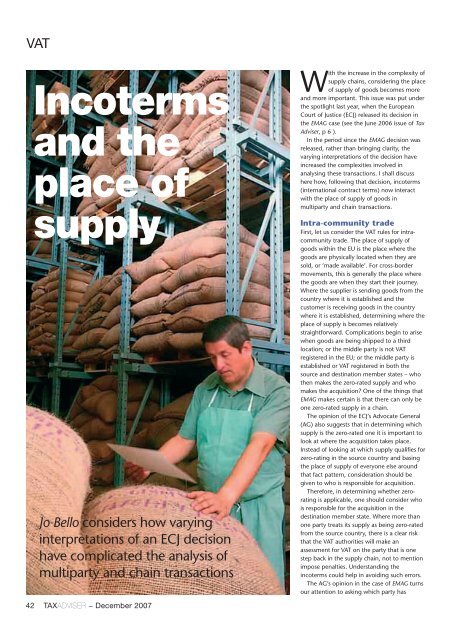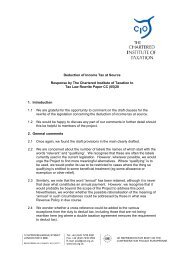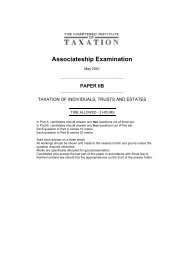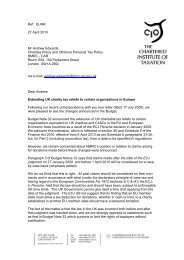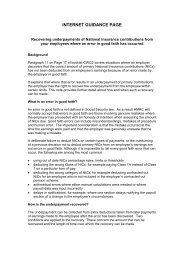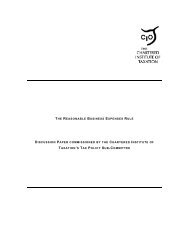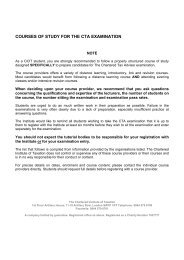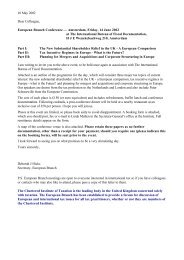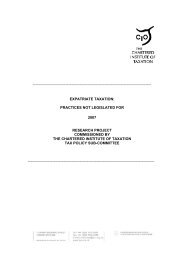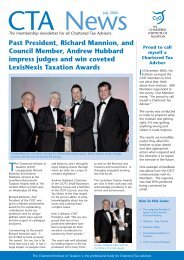VAT: Incoterms and the place of supply
VAT: Incoterms and the place of supply
VAT: Incoterms and the place of supply
You also want an ePaper? Increase the reach of your titles
YUMPU automatically turns print PDFs into web optimized ePapers that Google loves.
<strong>VAT</strong><strong>Incoterms</strong><strong>and</strong> <strong>the</strong><strong>place</strong> <strong>of</strong><strong>supply</strong>Jo Bello considers how varyinginterpretations <strong>of</strong> an ECJ decisionhave complicated <strong>the</strong> analysis <strong>of</strong>multiparty <strong>and</strong> chain transactions42 TAXADVISER – December 2007With <strong>the</strong> increase in <strong>the</strong> complexity <strong>of</strong><strong>supply</strong> chains, considering <strong>the</strong> <strong>place</strong><strong>of</strong> <strong>supply</strong> <strong>of</strong> goods becomes more<strong>and</strong> more important. This issue was put under<strong>the</strong> spotlight last year, when <strong>the</strong> EuropeanCourt <strong>of</strong> Justice (ECJ) released its decision in<strong>the</strong> EMAG case (see <strong>the</strong> June 2006 issue <strong>of</strong> TaxAdviser, p 6 ).In <strong>the</strong> period since <strong>the</strong> EMAG decision wasreleased, ra<strong>the</strong>r than bringing clarity, <strong>the</strong>varying interpretations <strong>of</strong> <strong>the</strong> decision haveincreased <strong>the</strong> complexities involved inanalysing <strong>the</strong>se transactions. I shall discusshere how, following that decision, incoterms(international contract terms) now interactwith <strong>the</strong> <strong>place</strong> <strong>of</strong> <strong>supply</strong> <strong>of</strong> goods inmultiparty <strong>and</strong> chain transactions.Intra-community tradeFirst, let us consider <strong>the</strong> <strong>VAT</strong> rules for intracommunitytrade. The <strong>place</strong> <strong>of</strong> <strong>supply</strong> <strong>of</strong>goods within <strong>the</strong> EU is <strong>the</strong> <strong>place</strong> where <strong>the</strong>goods are physically located when <strong>the</strong>y aresold, or ‘made available’. For cross-bordermovements, this is generally <strong>the</strong> <strong>place</strong> where<strong>the</strong> goods are when <strong>the</strong>y start <strong>the</strong>ir journey.Where <strong>the</strong> supplier is sending goods from <strong>the</strong>country where it is established <strong>and</strong> <strong>the</strong>customer is receiving goods in <strong>the</strong> countrywhere it is established, determining where <strong>the</strong><strong>place</strong> <strong>of</strong> <strong>supply</strong> is becomes relativelystraightforward. Complications begin to arisewhen goods are being shipped to a thirdlocation; or <strong>the</strong> middle party is not <strong>VAT</strong>registered in <strong>the</strong> EU; or <strong>the</strong> middle party isestablished or <strong>VAT</strong> registered in both <strong>the</strong>source <strong>and</strong> destination member states – who<strong>the</strong>n makes <strong>the</strong> zero-rated <strong>supply</strong> <strong>and</strong> whomakes <strong>the</strong> acquisition? One <strong>of</strong> <strong>the</strong> things thatEMAG makes certain is that <strong>the</strong>re can only beone zero-rated <strong>supply</strong> in a chain.The opinion <strong>of</strong> <strong>the</strong> ECJ’s Advocate General(AG) also suggests that in determining which<strong>supply</strong> is <strong>the</strong> zero-rated one it is important tolook at where <strong>the</strong> acquisition takes <strong>place</strong>.Instead <strong>of</strong> looking at which <strong>supply</strong> qualifies forzero-rating in <strong>the</strong> source country <strong>and</strong> basing<strong>the</strong> <strong>place</strong> <strong>of</strong> <strong>supply</strong> <strong>of</strong> everyone else aroundthat fact pattern, consideration should begiven to who is responsible for acquisition.Therefore, in determining whe<strong>the</strong>r zeroratingis applicable, one should consider whois responsible for <strong>the</strong> acquisition in <strong>the</strong>destination member state. Where more thanone party treats its <strong>supply</strong> as being zero-ratedfrom <strong>the</strong> source country, <strong>the</strong>re is a clear riskthat <strong>the</strong> <strong>VAT</strong> authorities will make anassessment for <strong>VAT</strong> on <strong>the</strong> party that is onestep back in <strong>the</strong> <strong>supply</strong> chain, not to mentionimpose penalties. Underst<strong>and</strong>ing <strong>the</strong>incoterms could help in avoiding such errors.The AG’s opinion in <strong>the</strong> case <strong>of</strong> EMAG turnsour attention to asking which party has
<strong>VAT</strong>Where <strong>the</strong> incorrect treatment is applied,<strong>the</strong> potential costs can be highorganised <strong>the</strong> transport so that <strong>the</strong>y will be<strong>the</strong> party that has <strong>the</strong> ‘right to dispose <strong>of</strong> <strong>the</strong>goods as owner’ at <strong>the</strong> point goods leave <strong>and</strong>arrive in member states <strong>of</strong> despatch <strong>and</strong>acquisition. The ECJ decided that this factorshould be taken into account, but it is not toodecisive. Interestingly, in many territories, <strong>the</strong>impact <strong>of</strong> taking into account who <strong>the</strong>transporter is in a <strong>supply</strong> chain can makedetermining where <strong>the</strong> <strong>place</strong> <strong>of</strong> <strong>supply</strong> is morecomplicated. It can be <strong>the</strong> incoterms thatprovide fur<strong>the</strong>r information to help determine<strong>the</strong> <strong>place</strong> <strong>of</strong> <strong>supply</strong>.<strong>Incoterms</strong> are a set <strong>of</strong> commercial terms,agreed in contracts between sellers <strong>and</strong>purchasers, which determine who bears <strong>the</strong>risk for <strong>the</strong> goods while in transit <strong>and</strong> whoincurs what costs. <strong>Incoterms</strong> range from EXW(ex-works) – <strong>the</strong> supplier provides <strong>the</strong> goodsat <strong>the</strong> factory gates <strong>and</strong> <strong>the</strong> customer isresponsible for collecting <strong>the</strong> goods, to CIF(cost, insurance <strong>and</strong> freight) – <strong>the</strong> supplier isresponsible for delivering <strong>the</strong> goods to <strong>the</strong>customer’s premises, for all costs (includingimport duties), insurance <strong>and</strong> freight. Theincoterms are a shorth<strong>and</strong> way <strong>of</strong> setting outwho is responsible for <strong>the</strong> key costs <strong>and</strong> risks<strong>of</strong> getting <strong>the</strong> goods from A to B. They do notdetermine when legal title to <strong>the</strong> goodspasses. That said, many sales contracts willstate that <strong>the</strong> legal title passes in accordancewith <strong>the</strong> incoterms, although that istechnically not in accordance with what <strong>the</strong>yare designed to achieve.So how can incoterms help determine <strong>the</strong><strong>place</strong> <strong>of</strong> <strong>supply</strong> for <strong>VAT</strong> purposes? Where aperson in <strong>the</strong> <strong>supply</strong> chain is <strong>the</strong> partyresponsible for bringing <strong>the</strong> goods into acountry, according to <strong>the</strong> incoterms, thissuggests that <strong>the</strong>y could be making <strong>the</strong>acquisition from a <strong>VAT</strong> perspective.The main complication in multipartytransactions arises when two or more <strong>of</strong> <strong>the</strong>parties in <strong>the</strong> transaction apply <strong>the</strong> sameincoterm to <strong>the</strong> transaction; <strong>the</strong>n <strong>the</strong>re arises<strong>the</strong> question <strong>of</strong> who exactly is <strong>the</strong> partypaying <strong>the</strong> import duty or making <strong>the</strong> exportdeclaration – both parties cannot beresponsible for <strong>the</strong> same thing, surely. If <strong>the</strong>incoterm on <strong>the</strong> final leg <strong>of</strong> a three-part chainis EXW <strong>the</strong>n, according to <strong>the</strong> incoterms, <strong>the</strong>final customer is responsible for <strong>the</strong> delivery<strong>and</strong> <strong>the</strong> dispatch from <strong>the</strong> member state <strong>and</strong><strong>the</strong>refore for making both <strong>the</strong> despatch <strong>and</strong><strong>the</strong> acquisition. If <strong>the</strong> incoterm on <strong>the</strong> first leg<strong>of</strong> a three-part chain is EXW, <strong>the</strong>n accordingto <strong>the</strong> incoterms, <strong>the</strong> second party in <strong>the</strong>chain is more likely to be consideredresponsible for making <strong>the</strong> acquisition.One risk that was highlighted in <strong>the</strong> EMAGdecision is where one party is making <strong>the</strong>acquisition but <strong>the</strong> goods are delivered to <strong>the</strong>end customer, commonly known a dropshipment.It is important to ensure that, in<strong>the</strong>se circumstances, <strong>the</strong> acquirer is confidentthat it is correctly charging local <strong>VAT</strong> <strong>and</strong> thatits customer will be able to recover it. Incircumstances where <strong>the</strong> customer isresponsible (under <strong>the</strong> incoterms) forarranging delivery, it could be difficult for <strong>the</strong>middle party to argue that its <strong>VAT</strong> has beencorrectly charged.This is particularly an issue for suppliers thatsource products from a variety <strong>of</strong> locations aswell as from local stocks. When <strong>the</strong> salesinvoices are raised to <strong>the</strong> customer, it may notbe clear where goods will be sourced from,<strong>and</strong> so <strong>the</strong> supplier’s preference in thissituation would be to charge local <strong>VAT</strong> on allsupplies. In <strong>the</strong>se circumstances, getting <strong>the</strong>incoterms correct to meet <strong>the</strong> desired <strong>VAT</strong>treatment will be helpful <strong>and</strong> will minimise <strong>the</strong>risk that <strong>VAT</strong> recoveries by customers are notrestricted.The incoterms could also interact withtriangulation in certain member states. Forexample, in Germany, use <strong>of</strong> triangulation isnot available where <strong>the</strong> <strong>supply</strong> is arranged by<strong>the</strong> final party in <strong>the</strong> chain. Therefore, if <strong>the</strong><strong>supply</strong> is EXW between <strong>the</strong> second <strong>and</strong> thirdparties, it might not be possible to use <strong>the</strong>triangulation simplification, <strong>and</strong> <strong>the</strong> middleparty will be forced to register for <strong>VAT</strong> inGermany. Apart from <strong>the</strong> administrativeburden <strong>of</strong> an additional <strong>VAT</strong> registration, <strong>the</strong>reare again cash flow consequences <strong>of</strong> waitingfor a refund <strong>of</strong> <strong>the</strong> <strong>VAT</strong> that <strong>the</strong> local suppliercharged.ExportsThe rules for zero-rating exports, movements<strong>of</strong> goods to a <strong>place</strong> outside <strong>of</strong> <strong>the</strong> EU, areslightly different from <strong>the</strong> rules for zero-ratingintra-community supplies. The <strong>place</strong> <strong>of</strong> <strong>supply</strong>remains <strong>the</strong> <strong>place</strong> where <strong>the</strong> goods arephysically located when <strong>the</strong>y are sold, ormade available. However, both <strong>the</strong> EU <strong>and</strong> UK<strong>VAT</strong> legislation specifically state that <strong>the</strong> rulesare different depending on who arranges <strong>the</strong>delivery <strong>of</strong> <strong>the</strong> goods. So, incoterms can havea greater influence here.Where <strong>the</strong> supplier is arranging delivery, <strong>the</strong><strong>supply</strong> is usually eligible for zero-rating,assuming that <strong>the</strong> exporter is able to retainevidence that <strong>the</strong> goods have left <strong>the</strong> sourcecountry.Where <strong>the</strong> customer arranges delivery <strong>of</strong><strong>the</strong> goods, <strong>the</strong>re is a quirk to <strong>the</strong> <strong>VAT</strong> rules<strong>and</strong>, just to complicate matters, <strong>the</strong> SixthDirective <strong>and</strong> <strong>the</strong> UK rules are subtly different.According to Article 146 <strong>of</strong> <strong>the</strong> recast SixthDirective, where <strong>the</strong> customer arranges <strong>the</strong>export (typically this is where <strong>the</strong> incoterm isEXW), <strong>the</strong> <strong>supply</strong> is only eligible for zeroratingby <strong>the</strong> supplier where <strong>the</strong> customer hasno fixed establishment in <strong>the</strong> source country.This differs from <strong>the</strong> UK law, which says that in<strong>the</strong>se circumstances, zero-rating by <strong>the</strong>supplier is only possible where <strong>the</strong> customer isnot <strong>VAT</strong>-registered in <strong>the</strong> UK. Again we cansee that in making <strong>the</strong> decision to zero-rate itis necessary to underst<strong>and</strong> <strong>the</strong> customer’staxable status <strong>and</strong> to underst<strong>and</strong> <strong>the</strong> impact<strong>of</strong> agreeing <strong>the</strong> correct incoterm.To sum upThe issues arising from incoterms can <strong>of</strong>tenseem just more administratively complex,ra<strong>the</strong>r than causing any real financial burden.However, where mistakes are made <strong>and</strong> <strong>the</strong>incorrect treatment is applied, <strong>the</strong> potentialcosts – particularly outside <strong>the</strong> UK – can behigh.On supplies made, <strong>the</strong> single biggest issueis <strong>of</strong>ten <strong>the</strong> cash flow cost <strong>of</strong> getting <strong>the</strong> <strong>VAT</strong>treatment wrong – delays in receiving <strong>VAT</strong>refunds from <strong>VAT</strong> authorities as well as delaysin receiving <strong>VAT</strong> payments belatedly chargedto customers. An error in incorrectly zeroratinga <strong>supply</strong> can lead to largemisdeclaration penalties <strong>and</strong> interest. This is inaddition to paying <strong>the</strong> <strong>VAT</strong>, which may bedifficult or, at best, time-consuming torecover. Where <strong>VAT</strong> has been incorrectlycharged, this can cause relationship problemswith customers who are refused <strong>VAT</strong> refunds,<strong>and</strong> again cash flow delays can beencountered in recovering overcharged <strong>VAT</strong>from <strong>VAT</strong> authorities. On supplies received, itis important to underst<strong>and</strong> that, where <strong>VAT</strong> ischarged, it is possible to recover it.Too <strong>of</strong>ten, transactions are entered intowith little thought for <strong>the</strong> implications arisingfrom <strong>the</strong> contract terms, which are <strong>of</strong>ten notreviewed or agreed by <strong>the</strong> finance function ina business. This is especially <strong>the</strong> case whereparties to <strong>supply</strong> chains are contained within acorporate group.Don’t assume that <strong>the</strong> <strong>VAT</strong> treatment <strong>of</strong>transactions in <strong>supply</strong> chains are withouterrors or potential risks. Review <strong>the</strong> incotermsin international <strong>supply</strong> contracts <strong>and</strong> considerwhe<strong>the</strong>r changes to <strong>the</strong>se terms could resultin any additional benefits.Jo Bello is an indirect tax director atPricewaterhouseCoopers LLPTAXADVISER – December 2007 43


